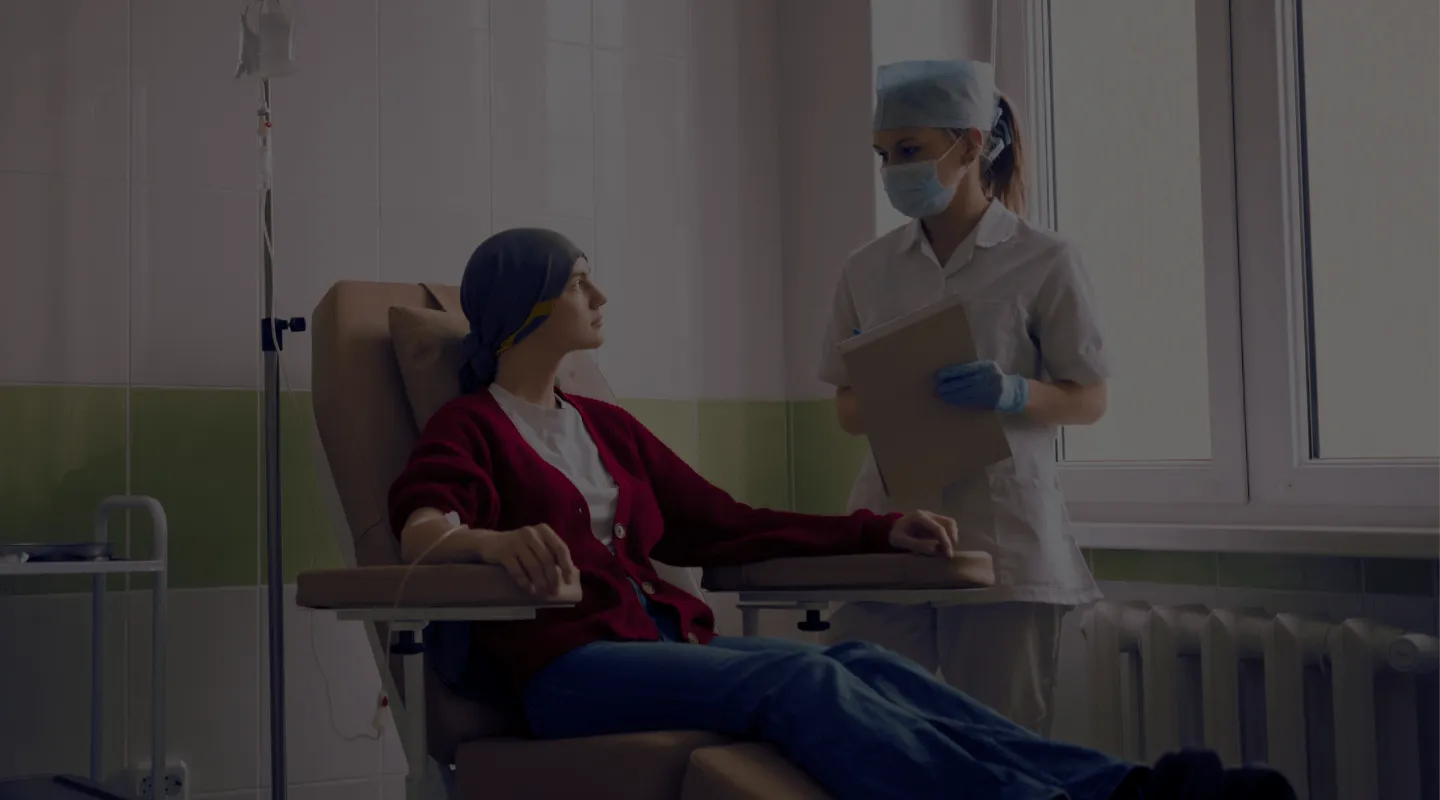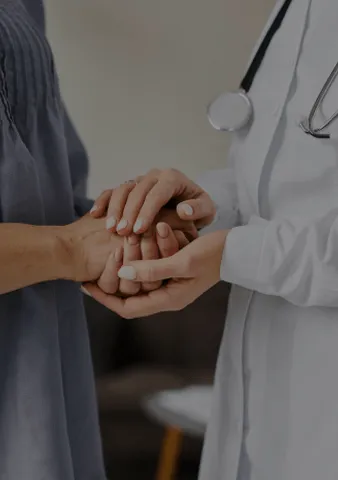
Chemotherapy
Your Chemotherapy in Tunisia at Affordable Prices
Our oncology teams support you at every step with a tailored protocol, a soothing environment, and attentive follow-up.
How does it work?
What is Chemotherapy?
Chemotherapy, also called chemo, is a cancer treatment that kills cancer cells or slows their growth. This involves administering various medications to the patient. Each patient receives a personalized drug combination based on their cancer type and progression. This combination may include chemotherapy alone or in conjunction with surgery to improve the chances of recovery. Chemotherapy may be given before or after surgery for complete treatment.
When a patient’s disease progresses, the oncologist has several options to choose the most appropriate procedure:
- Exclusive chemotherapy: this is the use of chemotherapy as the sole treatment;
- Radiochemotherapy: when radiotherapy and chemotherapy are combined, it is called radiochemotherapy;
- Neoadjuvant chemotherapy: Neoadjuvant chemotherapy aims to reduce the size of the tumor before chemotherapy, increasing the chances of successful treatment;
- Adjuvant chemotherapy: After surgery, adjuvant chemotherapy is an effective method for completely eliminating the tumor, eradicating remaining cancer cells, and decreasing the chance of cancer recurrence;
Who is Chemotherapy For?
Chemotherapy is primarily for patients with various types of cancer. It treats a wide range of cancers, including breast, lung, colon, prostate, ovarian, and many others. Chemotherapy may be recommended in several situations: as the main treatment to eradicate cancer cells, in addition to other treatments like surgery or radiotherapy to reduce tumor size before surgery or to eliminate remaining cancer cells after surgery. It can also control cancer progression and improve symptoms in patients with advanced or metastatic cancers. Each patient is assessed individually, and the chemotherapy treatment plan is personalized based on the cancer type, stage, patient’s overall health, and personal preferences.
What is the Cost of Chemotherapy in Tunisia?
In Tunisia, the science of oncology has seen remarkable advances in recent years in the diagnosis and treatment of cancerous diseases. Thanks to renowned specialists, cutting-edge medical infrastructure, and specialized laboratories, we are now able to offer personalized care for almost all types of cancer. What is even more remarkable is that the costs of our clinics are significantly lower than those of European establishments. Request a quote for your chemotherapy in Tunisia.
Chemotherapy in Tunisia: What to Know Before Starting Treatment
Chemotherapy in Tunisia : To start chemotherapy in Tunisia, it is essential to prepare a complete medical file and undergo a series of clinical examinations. The anatomopathological analysis of tumor tissues, also known as anapth, is crucial for defining the protocol to be followed. These analyses and examinations will be crucial to confirm the diagnosis, assess the patient’s condition, and determine if they are fit to undergo treatment. Before starting treatment, the oncologist will discuss with the patient to inform them of the potential side effects of the treatment. The specialist must also ensure that the patient has the necessary mental strength to follow the treatment and cope with its consequences. In some cases, the patient’s file is staffed. A multidisciplinary team of specialists, including oncologists, radiation therapists, and surgical oncologists, consults to establish the most appropriate care protocol for the patient’s case. This team can be expanded if the patient has other medical history such as diabetes or other conditions.
How Does Chemotherapy Proceed in Tunisia?
A course of chemotherapy usually involves several sessions, spaced 1 to 3 weeks apart. Treatment is usually administered intravenously, either in a hospital or a private clinic. In case of a negative reaction from the patient, immediate care is provided in the healthcare facility. Setting up a chemotherapy site is often necessary. A control scan is performed after half the treatments and at the end to identify the effectiveness of the chemotherapeutic treatment on the patient.
What are the Aftereffects and Side Effects of Chemotherapy in Tunisia?
When a patient undergoes chemotherapy, they may experience a variety of side effects, which can vary depending on their cancer type and physical condition. These side effects may include hair loss, weight loss, vomiting, nausea, and fatigue. To overcome these difficulties during the healing process, it is crucial that the patient receives specialized follow-up. The oncologist can then prescribe medications such as anti-vertigo or anti-nausea drugs to help the patient manage side effects. Treatment results will depend on the appropriate management of these side effects. The patient must have the mental strength and patience needed during treatment, but also during the recovery phase, which can be long. Family support is essential during this delicate phase.
Chemotherapy Recovery Time
The recovery time after a chemotherapy session varies depending on the type and dose of medication administered, as well as the individual response of each patient. In general, it is recommended to plan for complete rest during the days following the session, as chemotherapy can cause significant fatigue and other side effects such as nausea, vomiting, and a decrease in blood cells. This rest allows the body to recover and regenerate after the aggression of cancer cells and healthy cells by medication. It is crucial to follow the advice of the medical team, maintain a balanced diet, and stay hydrated. Some patients can gradually resume their normal activities after a few days, while others may need a longer rest period. Regular medical follow-up allows for adjustments to care and management of side effects to promote better recovery.
Combining Surgical Oncology with Chemotherapy Treatments in Tunisia?
In some cases, and when the tumor is localized, the surgical oncologist may recommend surgery in combination with chemotherapy treatments. This will often increase the chances of recovery for the patient. Depending on the patient’s condition, surgery can be performed. When scheduled before chemotherapy, it is called neoadjuvant chemotherapy to reduce the size of the tumor before starting treatment. On the other hand, when performed after surgery, it is called adjuvant chemotherapy, whose objective is to eliminate any residual cancer cells in the body.
Combining Radiation Therapy with Chemotherapy Treatments in Tunisia?
Chemotherapy can also be combined with radiation therapy sessions. This combination of the two procedures can provide better results for some patients. To determine the best approach, the oncologist in charge must consider the patient’s medical history. The number of sessions needed can differ from one individual to another. It is the oncologist in charge of your medical file, in collaboration with the radiation therapist, who will be able to confirm the duration of your treatment. Radiation therapy sessions are performed on an outpatient basis.
Why Choose Chemotherapy in Tunisia?
With Tunisia Destination Santé, organizing your medical stay in Tunisia is simple and fast. To quickly obtain a quote and be accompanied throughout the process, simply contact us. We are committed to guiding you step by step. Once on site, we will make every effort to ensure a safe and comfortable stay, thanks to the expertise of our oncology specialists who will take care of your treatment and medical follow-up. Do not hesitate to contact us to review your medical file and obtain a free quote. More information is available.
Our advantages


What are the Side Effects of Chemotherapy?
The side effects of chemotherapy can vary widely from person to person, depending on the type of medication used and the patient’s individual response. Among the most common side effects are fatigue, nausea and vomiting, hair loss, and a decrease in white blood cells, red blood cells, and platelets, which can increase the risk of infection, anemia, and bleeding. Other side effects may include digestive problems, such as diarrhea or constipation, pain and numbness in the hands and feet (neuropathy), as well as changes in taste and appetite. Chemotherapy can also affect the skin and nails, cause mouth sores, and lead to mild cognitive impairment often called “brain fog.” It is essential to discuss any effects experienced with the medical team to obtain adequate support and treatments to alleviate these symptoms.
Your Chemotherapy in Tunisia with TDS
TDS offers to support you from A to Z for all your medical stay organization procedures in Tunisia. Treat yourself to quality treatment in a state-of-the-art clinic equipped with the latest generation of radiotherapy equipment. You will be taken care of by a renowned oncologist and a team of experienced medical specialists. Do not hesitate to contact our advisors to benefit from their assistance and obtain all the necessary information on the procedures.
Your health, our priority.
Request your free quote.
Frequently Asked Questions
Yes, chemotherapy can affect fertility, especially in young patients. Some medications can damage the ovaries or testicles, which can lead to temporary or permanent infertility. It’s important to discuss fertility preservation options with a doctor before starting treatment.
Yes, it’s possible to minimize skin side effects by using moisturizing creams, avoiding excessive sun exposure, and wearing soft, loose-fitting clothing. Additionally, certain medications can be prescribed to manage specific skin conditions.
In some cases, yes. Certain forms of oral chemotherapy or infusion treatments can be administered at home under the supervision of a healthcare professional. This depends on the type of cancer and the treatment protocol.
This depends on the individual and the nature of their work. Some people can continue working part-time or full-time, while others may need to take time off due to fatigue and other side effects.
Chemo brain is a commonly used term to describe the memory and concentration problems some patients experience during and after chemotherapy. These effects can be temporary or last longer.
Chemotherapy can lead to feelings of depression, anxiety, and stress. Psychological support and supportive therapies can help patients cope with these emotional challenges.
Yes, chemotherapy can weaken the immune system, making patients more susceptible to infections. Doctors closely monitor blood counts and may recommend precautions to reduce the risk of infection.
Some chemotherapy drugs can have long-term effects on the heart, such as cardiomyopathy. It’s important to monitor heart health during and after treatment and consult a cardiologist if necessary.
Yes, chemotherapy can alter taste and smell, making some foods unappetizing or having a metallic taste. These changes are often temporary but can affect nutrition and appetite.
Yes, chemotherapy can alter taste and smell, making some foods unappetizing or having a metallic taste. These changes are often temporary but can affect nutrition and appetite.
Yes, complementary treatments such as acupuncture, meditation, moderate exercise, and nutritional therapy can help manage side effects and improve the overall well-being of patients undergoing chemotherapy. It’s important to discuss these options with an oncologist to ensure they are safe and appropriate.
